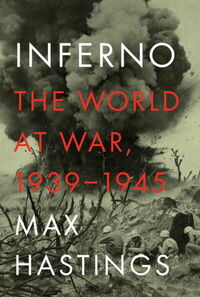Take a photo of a barcode or cover
challenging
dark
emotional
informative
reflective
medium-paced
dark
emotional
informative
reflective
sad
medium-paced
I'm going to take a moment to just pat myself on the back. Over a month after beginning this beast, I have finally completed it. Spending hours and hours underlining and commenting in the margins - reading at a pace of slightly over 20pgs an hour - I'm so thankful to have committed that effort to this masterpiece:
Inferno completely changed my viewpoint on the Second World War. It provided incredible insight and horrific details that have sufficiently expanded my knowledge of the subject. I know the one volume history acts as an outline to the magnitude of the war itself, but I have still learned so much about it. I consider myself to be a history buff, yet this book has gone above what I could have ever imagined: I have used almost forty tabs on especially awesome quotes and figures.
It is the definitive one volume history on the war.
Inferno completely changed my viewpoint on the Second World War. It provided incredible insight and horrific details that have sufficiently expanded my knowledge of the subject. I know the one volume history acts as an outline to the magnitude of the war itself, but I have still learned so much about it. I consider myself to be a history buff, yet this book has gone above what I could have ever imagined: I have used almost forty tabs on especially awesome quotes and figures.
It is the definitive one volume history on the war.
informative
medium-paced
challenging
dark
emotional
informative
reflective
sad
tense
slow-paced
challenging
informative
medium-paced
Any history of World War Two is a problem, and this one more than most. Hastings makes battles I had never heard of sound as if they were one of the circles of hell. The most powerful part of this book is how uniquely human he makes the war feel. It wasn't a war fought by patriots and soldiers of freedom on one side and monsters and the forces of evil on the other. Hastings devotes little time to the Holocaust, an unforgivable crime, if Hastings had not already written books that give much greater focus to the Holocaust. But he wants to make you feel what the average soldier felt, what the wife at home wrote to her husband at the front. What did the people who had to fight the Second World War think about having to fight it. Mercifully, Hastings does not devote much time to the troop movements and dispositions. What he seizes on is a state of mind, one of blood, shit, fear, and depression. It feels more real than any other history book I have ever read.
A very interesting and very good one volume work on World War II. It focused more on a layman's view of the war. Few bloated quotes from politicians and generals and more focus on the soldiers and civilians, which I found to be an interesting approach, even if it was clunky to start off. I've now read two single volume works on World War II and this one would be placed #2 on that list (Antony Beevor's book is a triumph) but I am happy I read it and found it very interesting and engaging.
This is a fantastic history of World War II. Whether you can't remember what you learned in history class and aren't even sure who fought, or if you're a fan of history and know loads of details, this one could be for you!
A lot struck me about this story, and much of it I already knew but found myself with a new appreciation for the depths of it. For example, I knew that Russia was the big roadblock to Germany and that Stalin's armies did much more to stop the Nazis than we Americans did. But it hit me anew how Russia stood alone, more or less, against the Nazis for a couple of years while America built up their forces. Along with that, I knew Stalin was a bad guy. But the realities of having to ally with Stalin and ignore some of his evil acts in order to win the war struck me anew. That may be the biggest question I take away, what does it look like to be allies with unscrupulous people? How much should the US work together with Russia, even allow them to take the lead, in fighting ISIS? (Kind of ironic how much Russia is in the news the last few days as I finished this.)
Of course, it is not like we Americans were good and pure. This too I knew but was struck by. We like to think we are the good guys fighting evil, but how did it sound to oppressed African-Americans to hear our government talk about liberation? How hypocritical were we to judge others for their actions against minorities in their countries and to act as we have in our country in dark moments in our history? Clearly America and Britain were better winners for the world and history than the Nazis would have been. But this does not erase our flaws.
Finally, it is amazing that early in the book the author talks of how the war was decided. There were hundreds of pages, years of fighting and millions of deaths to have. But when Germany was stopped in Russia and when Japan was slowed in the Pacific, the end was a foregone conclusion. Yes it is easy to admit that now, but even some of Hitler's generals saw it then. How many lives were wasted continuing the fight long past when the result became even more certain?
Overall, a great book.
A lot struck me about this story, and much of it I already knew but found myself with a new appreciation for the depths of it. For example, I knew that Russia was the big roadblock to Germany and that Stalin's armies did much more to stop the Nazis than we Americans did. But it hit me anew how Russia stood alone, more or less, against the Nazis for a couple of years while America built up their forces. Along with that, I knew Stalin was a bad guy. But the realities of having to ally with Stalin and ignore some of his evil acts in order to win the war struck me anew. That may be the biggest question I take away, what does it look like to be allies with unscrupulous people? How much should the US work together with Russia, even allow them to take the lead, in fighting ISIS? (Kind of ironic how much Russia is in the news the last few days as I finished this.)
Of course, it is not like we Americans were good and pure. This too I knew but was struck by. We like to think we are the good guys fighting evil, but how did it sound to oppressed African-Americans to hear our government talk about liberation? How hypocritical were we to judge others for their actions against minorities in their countries and to act as we have in our country in dark moments in our history? Clearly America and Britain were better winners for the world and history than the Nazis would have been. But this does not erase our flaws.
Finally, it is amazing that early in the book the author talks of how the war was decided. There were hundreds of pages, years of fighting and millions of deaths to have. But when Germany was stopped in Russia and when Japan was slowed in the Pacific, the end was a foregone conclusion. Yes it is easy to admit that now, but even some of Hitler's generals saw it then. How many lives were wasted continuing the fight long past when the result became even more certain?
Overall, a great book.
dark
emotional
informative
inspiring
reflective
sad
tense
slow-paced




